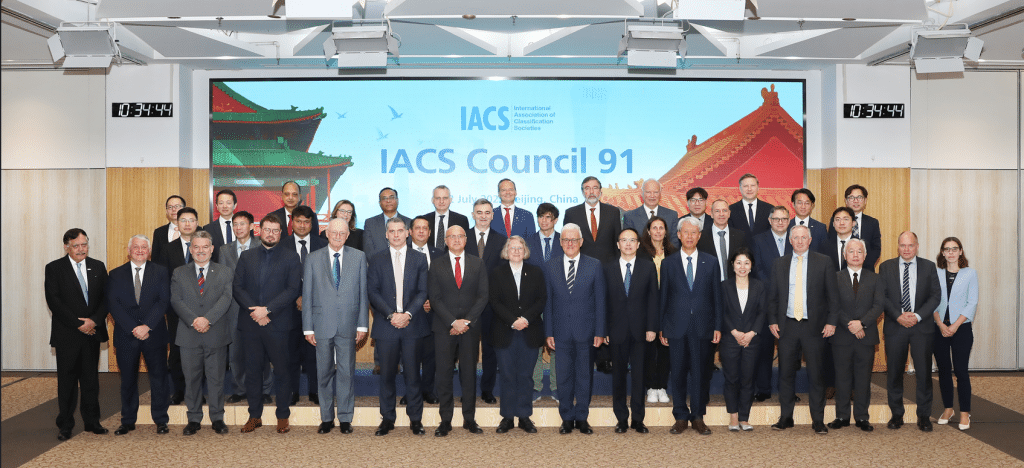Global Shipping Classification Body Advances Maritime Safety Standards at Beijing Summit
IACS Council tackles decarbonization, digitalization, and structural rules in landmark meeting

The International Association of Classification Societies (IACS) Council convened in Beijing last week for its 91st meeting, marking significant progress in maritime safety standards as the shipping industry navigates dual transitions toward cleaner fuels and digital technologies.
Three Years of Decarbonization Progress
The meeting, hosted by the China Classification Society, brought together senior representatives from all 12 IACS member organizations to assess the association’s achievements since launching its Safe Decarbonisation Panel three years ago. The Council reported rapid advancement in developing technical guidance for alternative fuels and new technologies across both newbuilds and existing vessels.
In line with IACS’s technology-neutral approach, the organization has now developed comprehensive instruments covering ammonia, methanol, hydrogen, battery systems, and carbon capture technologies. The association is also collaborating with flag states on critical safety matters including gas dispersion analysis and risk assessments for alternative fuels, as required by the International Code of Safety for Ships using Gases or other Low-flashpoint Fuels (IGF Code).
Looking ahead, the Council acknowledged preliminary work assessing IACS’s potential role in the introduction of nuclear technologies for maritime applications, signaling the industry’s openness to exploring all viable pathways toward decarbonization.
Digital Transformation Takes Center Stage
Despite being established only in January 2024, the Safe Digital Transformation Panel has made remarkable strides in clarifying IACS’s role in digitalization, cybersecurity, and the development of Maritime Autonomous Surface Ships (MASS). The panel’s work was presented at the International Maritime Organization’s FAL49 meeting earlier this year, supporting the IMO’s comprehensive digitalization strategy.
The Council highlighted the development of several IACS Resolutions addressing digital challenges, including cybersecurity controls for existing ships, vessel asset inventory systems, classification protocols for complex computer-based systems, 3D model exchange formats, risk assessments for autonomous vessels, and communications standards for remote connectivity.
Industry Collaboration Deepens
IACS emphasized its strengthened partnerships with other maritime organizations. Notable collaborations include work with CIMAC to advance digital discussions at the IMO, cooperation with BIMCO on automated fuel consumption data gathering, and participation in various Joint Industry Working Groups covering topics from anchoring equipment to underwater radiated noise reduction.
Common Structural Rules Under Review
A significant portion of the meeting focused on the ongoing review of Common Structural Rules (CSR) for oil tankers and bulk carriers. Following extensive industry consultation, the Council acknowledged the need to provide detailed technical explanations and demonstrate that revised rules would maintain or enhance current safety levels.
The Council announced that the previously stated timeline for CSR adoption should now be considered indicative only, allowing adequate time for industry feedback on consequence assessments. This flexibility reflects IACS’s commitment to ensuring stakeholder confidence in the revised standards.
Governance Evolution: ESG Integration
In a forward-looking move, the Council took initial steps toward integrating Environmental, Social, and Governance (ESG) principles into IACS governance. Recognizing that many member societies already maintain their own ESG policies, the Council agreed that association-wide principles would apply specifically to IACS activities while remaining closely aligned with its core mission of safety and environmental protection.
Strengthening Quality Assurance
The meeting also addressed IACS’s relationship with the International Quality Assessment Review Body (IQARB). Acknowledging IQARB’s new legal status and growing recognition by the IMO and flag states, the Council adopted a comprehensive framework to ensure continued IACS support and expert guidance for IQARB’s objectives.
Leadership Perspective
IACS Council Chair Roberto Cazzulo reflected on the meeting’s outcomes: “IACS’s ability to deliver on its core mission of providing substantive, detailed, technical contributions to the full range of industry discussions was reflected in the range of IACS instruments that C91 was invited to consider. Our Association’s sustained leadership can be seen in our discussions on the decarbonisation and digital transitions, ESG and IQARB, while our commitment to working with industry partners manifests itself in our strong commitment to joint industry groups and in our flexible, responsive approach to evolving the Common Structural Rules.”
Looking Forward
As the maritime industry faces unprecedented challenges in decarbonization and digitalization, IACS’s 91st Council meeting demonstrates the classification societies’ proactive approach to developing standards that ensure safety while enabling innovation. With comprehensive frameworks now in place for alternative fuels, digital systems, and autonomous vessels, the association is positioning itself as a key enabler of the shipping industry’s transformation.
The IACS Council, which has met biannually since the association’s founding in 1968, will continue to monitor industry developments and adapt its standards to meet evolving maritime needs while maintaining its unwavering commitment to safety and environmental protection.
